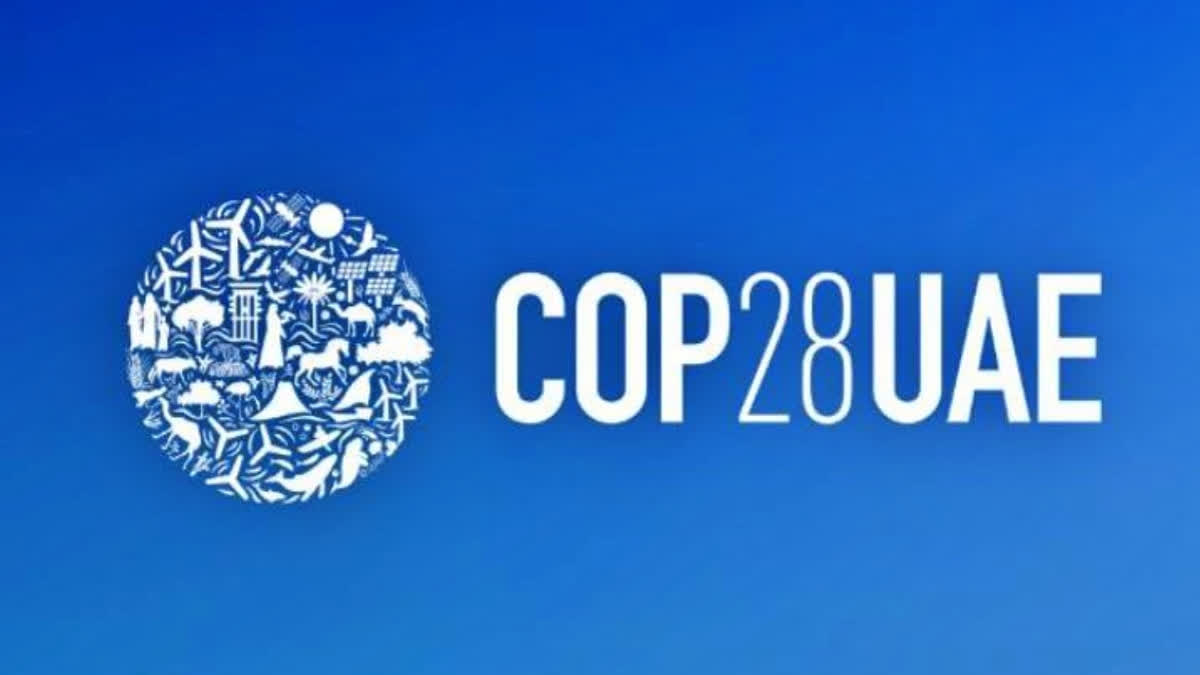New Delhi: Following the first-ever stocktake of the Paris Agreement of 2015 at the COP28 (28th Conference of the Parties of the United Nations Framework Convention on Climate Change or UNFCCC) that concluded in Dubai in the United Arab Emirates (UAE), the UAE Consensus that was adopted finally will leave India both relieved and happy.
About Paris Agreement:
At the COP21 held in Paris in 2015, the world agreed to limit global warming to 1.5oC compared to pre-industrial levels by 2050. The Paris Agreement and the climate action taken following this significantly helped in reducing emissions. In 2011, the projected warming by the year 2100 was 3.7–4.8oC. After COP27 held in Sharm-al-Sheikh, Egypt, it was 2.4–2.6oC and in the best case, if all pledges are accomplished, 1.7–2.1oC. As of September 2023, the world was not on track to reach the targets of the Paris Agreement.
"In a demonstration of global solidarity, negotiators from nearly 200 Parties came together in Dubai with a decision on the world’s first 'global stocktake' to ratchet up climate action before the end of the decade – with the overarching aim to keep the global temperature limit of 1.5°C within reach," the UNFCCC stated in a press release.
The final negotiated text encapsulates substantial commitments, including an ambitious climate agenda aimed at achieving the crucial goal of limiting global warming to 1.5°C. Notably, there is an unprecedented commitment to transitioning away from all fossil fuels, with the aim of achieving global net-zero emissions by 2050.
The agreement represents a significant advancement in expectations for the upcoming round of Nationally Determined Contributions (NDCs), emphasising the importance of "economy-wide emission reduction targets". Furthermore, the accord underscores progress in reforming the financial architecture, marking the first acknowledgement of the role of credit rating agencies and calling for an increase in concessional and grant finance. A specific new target is outlined to triple renewable energy capacity and double energy efficiency by 2030. Additionally, the agreement recognises the imperative to substantially increase adaptation finance beyond the previous doubling, acknowledging the pressing and evolving needs in this regard.
"Whilst we didn't turn the page on the fossil fuel era in Dubai, this outcome is the beginning of the end," said UN Climate Change Executive Secretary Simon Stiell in his closing speech. "Now all governments and businesses need to turn these pledges into real-economy outcomes, without delay."
India's problems regarding negotiations regarding the use of fossil fuels:
India had problems during the negotiations regarding the use of fossil fuels. India along with China and Indonesia were among the countries that did not agree with the initial draft of the agreement that called for "phase out of fossil fuels".
RK Singh, the Union Power Minister, had recently announced plans for India to augment its existing 50 GW of coal-based capacity by an additional 30 GW. Despite maintaining a commitment to achieving carbon neutrality by 2070, there are no immediate intentions to retire or repurpose coal-based power stations before 2030. Currently, three-fourths of India's power supply is derived from coal, and projections indicate that it will still constitute over 60 per cent of the energy mix in the next decade. This persistence is observed despite ongoing efforts to prioritise renewable energy, with substantial investments planned for enhancing both renewable energy storage capacity and grid connectivity. One of the primary challenges faced in this transition remains the need to address the intermittent nature of renewable energy sources.
Finally, all the participating countries at COP28 agreed to "transitioning away from fossil fuels in energy systems, in a just, orderly and equitable manner, accelerating action in this critical decade" instead of phasing out such fuels.
India hosts two side events during COP28:
During COP28, India also co-hosted two side events. On December 1, Prime Minister Narendra Modi together with UAE President Sheikh Mohammed bin Zayed Al Nahyan, co-hosted the high-level event on 'Green Credits Initiative'.
The Green Credit Initiative is based on the Green Credit Programme (GCP) that was notified by the Ministry of Environment in October this year. It basically envisions the issue of Green Credits for plantations on waste and degraded lands and river catchment areas in order to restore their vitality.
The GCP was notified by the Ministry of Environment, Forest and Climate Change on October 13. It is an innovative market-based mechanism designed to incentivise voluntary environmental actions across diverse sectors, by various stakeholders like individuals, communities, private sector industries, and companies. The GCP's governance framework is supported by an inter-ministerial Steering Committee and the Indian Council of Forestry Research and Education (ICFRE) serves as the GCP administrator responsible for programme implementation, management, monitoring, and operation.
"In its initial phase, the GCP focuses on two key activities: water conservation and afforestation," the Ministry said in a statement. "Draft methodologies for awarding Green Credits have been developed and will be notified for stakeholder consultation. These methodologies set benchmarks for each activity/process, to ensure environmental impact and fungibility across sectors. A user-friendly digital platform will streamline the processes for registration of projects, its verification, and issuance of Green Credits. The Green Credit Registry and trading platform, being developed by ICFRE along with experts, would facilitate the registration and thereafter, the buying and selling of Green Credits."
Green Credit signifies a form of incentive allocated to individuals and entities actively involved in endeavours that yield favourable outcomes for the environment. This voluntary initiative, spearheaded by the government, aims to motivate diverse stakeholders to play a role in environmental conservation and adopt sustainable practices. Integral to the overarching 'LiFE' (Lifestyle for Environment) campaign, this programme actively promotes and acknowledges voluntary actions that contribute positively to the environment.
The GCP encompasses the following types of activities aimed at enhancing environmental sustainability: planting trees to increase green cover and combat deforestation; implementing strategies to efficiently manage and conserve water resources; promoting eco-friendly and sustainable agricultural practices; implementing effective waste management systems to reduce environmental pollution; initiatives aimed at reducing air pollution and improving air quality; and protecting and restoring mangrove ecosystems for ecological balance.
To accrue Green Credits, individuals must enlist their eco-friendly endeavours on a specialised government website. These activities will undergo scrutiny by an assigned agency. Upon receiving the agency's assessment, the administrator will issue a Green Credit certificate to the participant. The computation of Green Credits hinges on factors like resource needs, scale, scope, size, and other pertinent parameters crucial for attaining the intended environmental results.
An integral aspect of the initiative involves setting up a Green Credit Registry to effectively monitor and oversee accumulated credits. Furthermore, the administrator will institute and uphold a trading platform, facilitating the exchange of Green Credits within a domestic market.
In such a trading system, businesses or individuals with surplus Green Credits can sell them to those who need to meet sustainability goals or regulatory requirements. This creates a market-driven mechanism to encourage and reward environment-friendly practices.
During the event co-hosted by India and the UAE in Dubai, a web platform which would serve as a repository of policies and best practices that incentivize environment-friendly actions was also launched.
"This global initiative aims to facilitate global collaboration, cooperation and partnership through exchange of knowledge, experiences and best practices in planning, implementation and monitoring of environment positive actions through programs/mechanisms like Green Credits," the Prime Minister's Office (PMO) said in a statement.
Separately, India also co-hosted with Sweden another side event themed ‘LeadIT 2.0'. Prime Minister Narendra Modi, along with his Swedish counterpart Ulf Kristersson co-launched Phase II of the Leadership Group for Industry Transition (LeadIT 2.0) for the period 2024-26.
LeadIT was a joint initiative launched by India and Sweden in 2019 at the UN Climate Action Summit in New York. Essentially, this initiative fosters collaboration among the decision-makers bringing together both the public sector and the private sector with the objective of accelerating the industry transition to net zero emissions essentially from heavy industries.
The LeadIT initiative places particular emphasis on challenging sectors crucial to global climate action that necessitate targeted interventions. It brings together nations and businesses dedicated to fulfilling the objectives of the Paris Agreement.
The Paris Agreement's long-term temperature goal is to keep the rise in mean global temperature to well below 2oC above pre-industrial levels, and preferably limit the increase to 1.5oC, recognising that this would substantially reduce the effects of climate change. Emissions should be reduced as soon as possible and reach net zero by the middle of the 21st century.
Introduced during the UN Climate Action Summit in 2019 by the governments of Sweden and India, it enjoys support from the World Economic Forum. Members of LeadIT share the conviction that energy-intensive industries have the capacity and obligation to transition towards low-carbon trajectories, aspiring to attain net-zero carbon emissions by 2050.
According to the LeadIT website, a successful transition for hard-to-abate sectors requires a level playing field globally, finance for implementation, accountability across value chains, low-carbon technology diffusion and scale-up, and enabling infrastructure.
"To accelerate this, we foster collaboration between decision-makers in the public and private sector to enable the needed policy environment, finance flows, and exchange of best practice," the website definition of the initiative reads.
It states that this can be done by convening and participating in high-level dialogues to set the international agenda to align on actions for net-zero; holding regular meetings between private and public decarbonisation experts; supporting road-mapping processes with science-based tools and workshops; tracking plans and investments to decarbonise heavy industry sectors; and carrying out analysis that informs policymaking.
During the event in Dubai, India and Sweden also launched the Industry Transition Platform, which will connect the governments, industries, technology providers, researchers and think tanks of the two countries.
“During the event, Prime Minister (Narendra Modi) highlighted that LeadIT 2.0 will focus on the following: inclusive and just industry transition; co-development and transfer of low-carbon technology; financial support to emerging economies for Industry Transition,” the PMO said in another statement.
India launches Global River Cities Alliance:
During the annual climate summit, India also launched a new initiative called the Global River Cities Alliance (GRCA). The GRCA, led by the National Mission for Clean Ganga (NMCG) under the Ministry of Jal Shakti, is a unique alliance covering over 275 global river cities in 11 countries, international funding agencies and knowledge management partners and is the first of its kind in the world.
"The launch of GRCA signifies a momentous step in global efforts toward river conservation and sustainable water management," the Ministry of Jal Shakti said in a statement. "Following this, partner countries are poised to coordinate post-COP activities, shaping the architecture of GRCA for effective implementation."
As the world grapples with the urgent need to address the climate crisis, India's initiatives not only contribute significantly to mitigating carbon emissions but also set a precedent for responsible and inclusive environmental stewardship. Through collaborative efforts, forward-thinking policies, and a dedication to fostering international cooperation, India's pivotal role in shaping a resilient, low-carbon future is inspiring a shared commitment to safeguarding the planet for generations to come.
Read more:
- Year-ender 2023: What is future of Russia's lunar mission after its Luna 25 spacecraft crashes
- Year-ender 2023: Sinking Joshimath hill town remains a ticking time bomb
- Year-ender 2023: India pulls off a successful mountainous feat in Silkyara Tunnel Rescue
- Year-ender 2023: India’s G20 Presidency characterised by spearheading solutions for global prosperity


